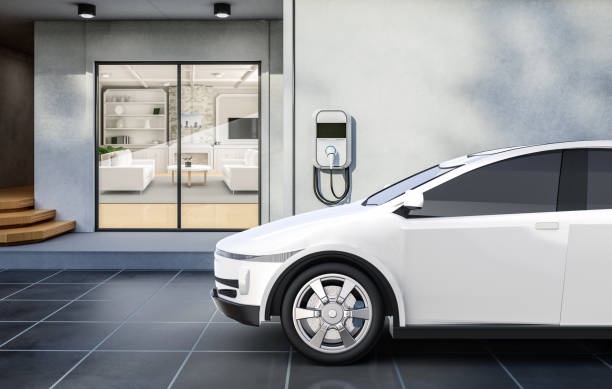As electric vehicles continue growing in popularity due to lower maintenance costs and eco-friendly emissions reductions supporting sustainability goals. Moreover, the prospect of conveniently charging vehicles overnight using home garages and driveways becomes increasingly appealing across households. However, the proper EV charger design, installation protocols, permits, and electrical load calculations are required.
Charging Equipment Classifications
Not all electric vehicle charger installations prove equal regarding throughput power delivery and infrastructure demands. Classification levels help distinguish capabilities, average charging duration expectations, and installation complexity spanning:
Level 1
Slow battery charging relying on 120V household outlets through supplied compact cords. Extended charging times using normal plugs make Level 1 ports suitable only overnight. Generally, no installation is required, but multiplying outlets using power strips holds a risk of overloading circuits.
Level 2
Faster 240V ports demanding dedicated 40-60amp breakers and wiring able to refill batteries within 4-8 hours. Installation includes wiring upgrades with the potential for permits and inspections before activation depending on electrical service configurations. Commercial rapid charging stations, utilizing industrial converters and operating at 480+ volts, accelerate the vehicle battery refill process. Furthermore, these stations rely on large-scale grid connections, posing a challenge for residential properties to easily supply such power.
Determining Home Charging Needs
Suitable charger types depend largely on variables, for instance:
- Vehicle model specifications
- Average existing home electrical loads
- Charging duration flexibility overnight and installation budgets
Those relying purely on residential charging, rather than workplace or commercial stations, must determine if overnight Level 1 trickle charging satisfies commute needs. Alternatively, they need to assess if Level 2 capacities are important for minimizing downtimes through faster restoration. Consulting specific vehicle tech manuals clarifies optimal voltages.
When EV Charger Permits Become Necessary
Permits for EV chargers become necessary when addressing common misconceptions among consumers. Some assume that plugging a basic EV connection into any household wall socket is free from regulatory requirements. However, making sure the safe delivery of suitable charging capacity involves considerations such as:
- Properly sized wiring
- Supported amperages
- Assessments of electrical loads.
While the permitting process may come with a certain overhead, approved installations significantly enhance reliability, inspection compliance, and safety measures compared to disregarding regulatory governance. Ignoring permitting requirements can lead to improper DIY wiring, risking failures that may escalate into fires or other hazardous reactions. Therefore, it is essential to prioritize diligence in considering and adhering to permitting processes for EV charger installations.
We clarify the most common scenarios provoking permitting requirements below:
Safe Power Delivery
Running new dedicated branch circuits for Level 2 EV charger system asks for thick wires capable of routing 40-60 amp capacities. The permit for EV chargers is necessary to guarantee that plans comply with rules because these circuits run on isolated systems. Inspectors are essential in reviewing these designs since they are knowledgeable about EV infrastructure.
Even if outlets or breaker boxes have unused capacity, standalone EV circuits necessitate separate planning signoffs. Officials overseeing these permits ensure safety and compliance by vetting isolation needs and conducting wire gauge calculations. Furthermore, they also keep jurisdictions informed about charging station inventories to track local EV adoption metrics.
Managing Electrical Loads
Charger electrical loads and whole-house power demand evaluations become critical considerations. Properties with existing substantial appliances, such as hot tubs, risk overdrawing total electrical service deliverable amp capacities. Moreover, this can lead to tripping breakers or brownouts when adding EV charging profiles to the aggregate demand equation. Permits facilitate load calculations and may mandate upgrades.
Condo/Townhome Electrical Room
In condo or townhome settings, electrical room hookups present unique challenges. Multi-family residential blocks with shared common area infrastructure must validate available electrical capacities before making connections. An EV charger permit is needed to verify contingencies and protections for neighbors, preventing arbitrary modifications to existing distribution grids supporting outdoor lots or other EV amenities.
Harnessing Solar Power
Home photovoltaic/solar panel integration is gaining popularity for domestic energy generation. Regulators are increasingly scrutinizing grid ties, inverter specifications, battery storage sizes, and panel wattages. This scrutiny confirms that cumulative household electric capacities, especially with EV charging additions, adhere to local standards.
Understanding Associated Permitting Costs
Base Home Electrical Permit Processing:
When estimating budgets for EV charger installations, permitting costs constitute a relatively small proportion compared to materials, electrician man-hours, and potential unforeseen challenges. On average, processing a basic home electrical permit ranges from $100 to $300. The variation is influenced by regional labor rates and complexity factors, particularly in cases where the scope is limited to electrical work. Costs tend to increase with broader structural enhancements.
Evaluation/Reinspection:
The costs associated with evaluating and reinspecting capacity upgrades range from $0 to $200. This pertains to incremental site assessments, often required for reattending failed inspections that demand a more in-depth analysis before reauthorization. The expenses are contingent on the extent of additional work needed.
Project Costs (if necessary):
If a capacity upgrade is deemed essential to support EV infrastructure based on usage, project costs can range from $3,500 to upwards of $10,000. This includes enhancements to the entire home electrical service, involving the installation of new meters, thicker gauge wiring, and expanded distribution. Additionally, the specific costs within this range depend on the extent of upgrades required.
Note
If multiple individuals use the charging station, provide guidelines on proper usage and safety practices of wall charger installation. This includes avoiding the use of damaged cables and adapters.
You need to clearly label the circuit breaker corresponding to the wall charger for quick identification in case of emergencies or maintenance. Chargers may generate heat during operation, therefore, go for proper ventilation to dissipate or prevent heat.
Periodically inspect the charger, wiring, and electrical connections for signs of wear or damage. Address any problems promptly to maintain safety and performance.
Wrap Up
While the permitting process surely injects extra steps before tangible EV charger activation, the nominal effort and initial costs have paid sustainable dividends over decades. This enhances property improvements, home values, and everyday convenience through reliable infrastructure built safely to code practices, backed by governance assurances. Staying informed smooths journeys, realizing electrified transportation futures. If you have any further queries regarding the permits, reach out to Clean Clacs for expert-level consultation!


No comments yet